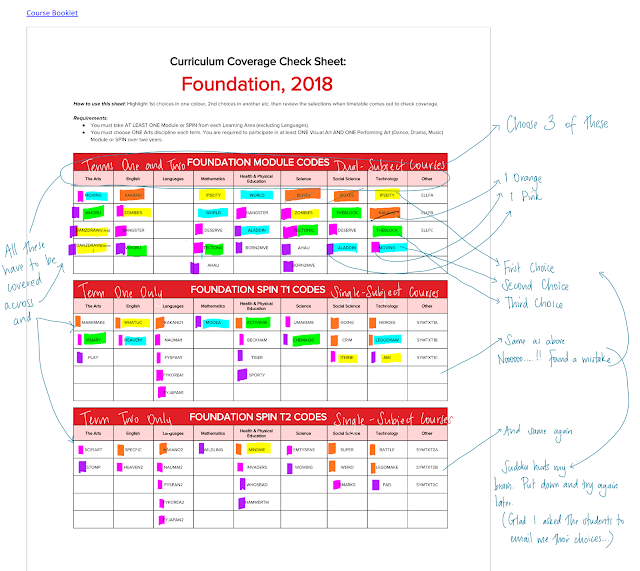My brother's mother-in-law asked me last week what the difference was between teaching at the two different schools. Week 4 at HPSS has had me reflecting on the differences in teaching practise between what I was doing at my last school and what I do now. Not much is different - yet. However, I have taken mental note of the differences in teaching, and this is what I've come up with.
Two Teachers and Subjects in Some Classes
The most obvious difference are the modules. These are the classes I teach with another teacher from another curriculum area. I teach two of these - one is called Kakahu and the other is called DBAD101. Both of these courses run for a semester.Kakahu
Kakahu is a foundation module which means the students are years 9 and 10. I co-teach this module with a technology teacher and together we're exploring fashion. We sit together for 80 minutes every Friday morning and plan our next week.
This week we are using reading and drawing skills to interpret characterization. We'll look at characters and interpret their personalities. We'll look at the opening clip of Inside Out and look at how characters and emotions are visualised. We'll read a text and highlight character descriptions. Based on the interpretations of characters, they'll use kiki babou and color theories to create symbols for characters. They will then use these symbols in creating a storyboard to visualize a short story that we'll annotate and unpack together.
This is different to teaching my year 9 classes and my year 10 classes on my own. While I still had the reading skills happening, and I still tried to get students to visualize the symbols, I never managed to get the quality of work out of students that my co-teacher does. She has the subject-specific knowledge which empowers her to get great visual results out of the students.
 |
| A section of our planning document where we can see who is responsible for what for our up-coming classes. |
DBAD101
As with Kakahu, this is a one-semester course. It's year 11 / Level 1 NCEA. It's a combo of English and PE with a focus on leadership, communication, and conflict. We have chosen texts that look at these concepts, and I have asked the students to find a novel that has these ideas in them as well.
We have been looking at the concepts of leadership and communication, and as we have done so, we have taken them out to the PE field and had a go at using these skills in practical situations. This is something I was always keen on doing, but didn't know how to pull it off. Having a PE teacher in every class means I always have someone to bounce off.
Having two teachers in the class is great in other ways too - when kids who are working hard and need my time to really get the concepts, there is another teacher available for behaviour management, or to float and talk to the other students and explore concepts with.
 |
| A section of our planning doc showing how we are going to explore the film in a practical way through PE |
Flexible, Responsive, Blended Learning
This kind of practise all teachers strive for. We all want to ensure the success of all our students. I've always had playdough in my room. In recent years I've had maker-spaces with equipment to create with. Colored paper, glue, scissors... I've spent hours and hours learning how to teach with technology, so that devices weren't just word processor, but powerful learning tools. Difficulties arose with students not wanting to bring their devices to school. Being in an environment where devices, Universal Design for Learning strategies, and flexibility is normal makes teaching in this way much much easier.My plan for my Level 2 class on Monday (2x80 minute blocks) has space for this.
Romeo and Juliet Act Two Activities
Flexibility also comes in spaces that I can use. I have taught in small, glass-encased meeting rooms, large open spaces, the auditorium, the tennis courts, the library, a social space, a tech room... All in two weeks. I currently have a lot of flexibility in where my class is depending on what we're doing.
 |
| The online classrooms that facilitate flexible, autonomous learning |
Structured Tools Enable Flexibility
This has been instrumental to my feeling of calm in teaching. I have always strived for flexible, differentiated learning, and have tried to use assessment for learning techniques. I kept looking to find the best way, and never managed to get or create what I wanted. One of the biggest blessings in coming to HPSS is that the DP in charge of Curriculum and Learning has spent the time with her team researching and deconstructing every facet of the New Zealand Curriulum and the NCEA assessment documents. This has allowed her, with her team, to generate a solid foundation of tools, vocabulary, and practices that are versatile and cover every learning area. I feel freed up to use the tools, design my lessons, and know that the students will understand.By looking at the learning matrix for the school and combining it with the assessment rubric for the work that I'm doing, I get clear and streamlined learning objectives that clarify what learning activities I need to find or create.
 |
| Romeo's and Juliet's Coming of Age Journey |
So What is the Difference?
In the end, the differences come down to:Consistent, visible learning frameworks
Consistent expectations for autonomous learning
Consistent expectation that learning is grounded with a real-life application, and
Consistent expectation that the students can get out into the community or engage the community and use their skills.













